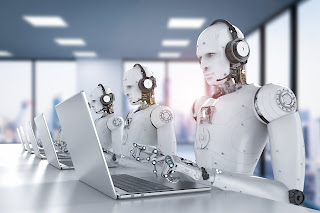Will AI Take Over Our Jobs? The Truth About Automation and the Future of Work
As technology continues to advance at a rapid pace, there is growing concern about whether AI will take over our jobs. Many people fear that automation will lead to mass unemployment and economic instability, while others believe that it will bring about a new era of productivity and efficiency. So, what is the truth about AI and the future of work? Let's take a closer look.
First, it's important to understand what AI is and how it works. AI, or artificial intelligence, refers to the ability of machines to learn and perform tasks that would normally require human intelligence, such as visual perception, speech recognition, decision-making, and natural language processing. This is accomplished through the use of algorithms, neural networks, and other techniques that allow machines to process and analyze vast amounts of data.
The use of AI in various industries has already led to significant improvements in efficiency, accuracy, and cost-effectiveness. For example, in the healthcare industry, AI-powered systems are being used to diagnose diseases, analyze medical images, and develop new treatments. In the financial sector, AI algorithms are being used to detect fraud and make investment decisions. In the transportation industry, self-driving cars are being developed that could revolutionize the way we travel.
However, the widespread adoption of AI also raises important questions about its impact on the workforce. Many jobs that are currently done by humans could potentially be automated in the future, including jobs in manufacturing, transportation, customer service, and data entry. This could lead to job displacement and unemployment for many workers, particularly those in lower-skilled jobs.
But it's important to note that not all jobs are equally at risk of being automated. According to a report by the McKinsey Global Institute, jobs that involve manual labor or repetitive tasks, such as assembly line work or data entry, are more likely to be automated in the coming years. Jobs that involve creativity, critical thinking, and interpersonal skills, such as healthcare professionals, teachers, and artists, are less likely to be automated.
Moreover, while AI may automate some jobs, it could also create new jobs and opportunities. For example, the development and maintenance of AI systems will require a skilled workforce of engineers, data analysts, and software developers. Additionally, the increased efficiency and productivity that AI can bring could lead to the creation of new industries and business models.
So, what does all of this mean for the future of work? It's likely that the widespread adoption of AI will lead to significant changes in the labor market. Some jobs may become obsolete, while new jobs will be created. Workers will need to adapt to these changes by developing new skills and taking advantage of opportunities in emerging industries.
But it's important to remember that technology is not deterministic. The impact of AI on the workforce will depend on a range of factors, including the pace of technological advancement, the availability of skilled workers, and the decisions made by policymakers and business leaders. It's possible to shape the future of work in a way that maximizes the benefits of AI while minimizing its negative impact on workers.
So, will AI take over our jobs? The answer is not a simple yes or no. The impact of AI on the workforce will be complex and multifaceted. While some jobs may be automated, new opportunities will also be created. It's up to us to navigate these changes in a way that ensures that everyone has access to the benefits of AI.
In conclusion, the adoption of AI is likely to bring about significant changes in the labor market, but the impact of these changes is not predetermined. The future of work will depend on a range of factors, including technological advancement, workforce development, and policy decisions. It's important to approach these changes with a proactive and forward-thinking mindset and to work together to create a future of work that maximizes the benefits of AI while ensuring that no one is left behind. With the right approach, we can build a future that is more productive, efficient, and equitable for everyone.
Labels: Interesting, Technology


0 Comments:
Post a Comment
Subscribe to Post Comments [Atom]
<< Home